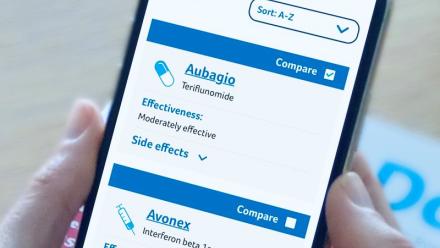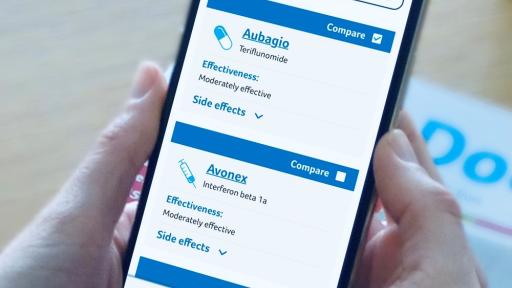Ponvory (ponesimod) is a disease modifying drug (DMD) for relapsing remitting MS.
You take Ponvory as a pill once a day, to reduce the number and severity of relapses. It reduces the number of relapses by about one half (50%).
Common side effects include increased risk of infections including colds, chest infections and urinary tract infections.
What is Ponvory used for in MS?
Ponvory is a disease modifying drug (DMD) for relapsing remitting MS. You have fewer relapses than you might have had with no treatment and any relapses you do have should be less severe.
Ponvory is a more effective (category 1.2) DMD; in clinical trials, people taking Ponvory had about 30% fewer relapses than people taking Aubagio. In clinical trials, MRI scans showed that people taking Ponvory had fewer, smaller or no new areas of active MS (lesions). Ponvory may also slow down the build-up of disability associated with MS.
Ponvory can be prescribed for adults with active relapsing remitting MS.
Ponvory has been approved for use on the NHS since 2021. It can only be prescribed by a neurologist.
It’s important that you tell your MS team if you have any health problems or are taking other medicines. Ponvory may not be appropriate if you have existing medical conditions including: active cancer, a serious infection such as hepatitis or tuberculosis, or severe problems with your heart, liver or immune system.
If you have certain conditions, including heart problems, liver disease or a condition affecting your eyes, you may need additional medical assessment before Ponvory is prescribed and may need additional monitoring during treatment.
You must not become pregnant while taking Ponvory. There is an increased risk of having a baby with birth defects if Ponvory is taken during pregnancy.
Women of childbearing age must use an effective method of contraception during treatment and for at least one week after stopping Ponvory.
Ponvory should not be started by women who are pregnant or planning to become pregnant in the near future.
Women who wish to become pregnant should stop taking the drug but continue to use effective contraception for one week to ensure that blood levels of Ponvory are low enough for it to be safe to become pregnant.
If you do become pregnant while taking Ponvory you should contact your MS team straight away.
You take Ponvory as a pill, once daily.
To give your body time to get used to the drug and reduce the impact of side effects, you start on a low dose for the first 14 days, gradually increasing to the full dose on day 15.
You should not stop taking Ponvory without discussing your ongoing treatment with your neurologist, as your MS may become more active after stopping Ponvory.
What side effects could I get with Ponvory?
Common side effects include increased risk of infections including coughs, colds and chest infections and increased levels of liver enzymes.
Common side effects (affecting more than 1 person in 100)
- infections including coughs, colds and chest infections
- urinary tract infections
- herpes zoster (shingles)
- swelling in the back of the eye (macular oedema)
- low levels of white blood cells (lymphopenia)
- high blood pressure
- increased levels of liver enzymes
Less common side effects (affecting less than 1 person in 100)
- slow heart rate
- skin cancer
A full list of side effects is included in the manufacturer's Patient Information Leaflet.
Assessment before treatment
Before starting Ponvory, your doctor will check that you are protected against chickenpox. Your heart will be checked with an electrocardiogram (ECG). You should have blood tests to measure blood cell counts and check liver function. Your doctor should check your vision before you start taking Ponvory and also anytime you notice vision changes during treatment.
As Ponvory must not be taken during pregnancy, women of child-bearing age may be offered a pregnancy test.
If you have a history of heart problems, you may be monitored for the first 4 hours after taking your first dose.
Ponvory may increase your risk of skin cancer. You should limit your exposure to sun light and ultraviolet (UV) light, by wearing protective clothing and applying sunscreen with high sun protection factor.
Assessment during treatment
Once you’ve started treatment, you’ll have regular blood tests to monitor liver function and measure blood cell counts. Your blood pressure should be regularly checked and if you have a history of eye problems or diabetes, you may be offered further eye tests. Your doctor may also check your skin for any sores, lumps or damaged areas that may be a sign of cancer.
During the coronavirus outbreak, you may find that your regular blood tests happen less frequently, may take place in a different location or may temporarily stop.
Ponvory binds to the surface of white blood cells (lymphocytes) in the blood, and these cells are then trapped in the lymph glands, which prevents the lymphocytes from crossing into the central nervous system and causing inflammation and damage.
Evidence for the effectiveness of Ponvory has come from one large study:
OPTIMUM - Ponvory compared to Aubagio (teriflunomide)
This phase III study recruited 1133 participants with relapsing MS who took either Ponvory or Aubagio once daily for 2 years. Those on Ponvory experienced a 30% reduction in relapse rate, 56% reduction in active lesions, and a statistically significant improvement in fatigue symptoms compared to Aubagio. There was a trend toward less disability progression on Ponvory, but this was not statistically different to Aubagio.
-
Kappos L, et al.
Ponesimod compared with teriflunomide in patients with relapsing multiple sclerosis in the active-comparator phase 3 OPTIMUM study: A randomized clinical trial.
JAMA Neurol. 2021;78(5):558-567
Read the full paper (link is external)
National Institute for Health and Care Excellence (NICE)
Ponesimod for treating relapsing–remitting multiple sclerosis.
NICE technology appraisal guidance TA767
Full guideline (link is external)


